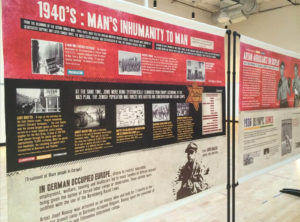
The City of Chandler, Ariz., sponsors the Celebration of Unity each year to honor community diversity, the achievements of the civil rights movement and the spirit, ideals, life and legacy of Dr. Martin Luther King Jr. The 15th annual celebration in January and February 2015 brought together multicultural lectures, music, crafts and ethnic food, culminating in a naturalization ceremony for 200 Arizona residents from countries around the world. A traveling exhibit that explores three distinct struggles for freedom in the early and mid-20th century serves as the back story for “Unity Fest” discussions of diversity. Mutoh America Inc., Phoenix-based manufacturer of large-format inkjet printers tailored to manage large-scale display graphics, donated printing and graphics for the exhibit “Then They Came for Us,” showcased in April.
The exhibit uses constructed panels, archival film footage and artifacts to link three disparate events: the Holocaust; the treatment of people of color in Eastern Europe; and the African-American struggle for civil rights. The displays follow the paths people took between 1900 and 1960 to achieve freedom, safety and dignity.
 TEXTILES.ORG
TEXTILES.ORG


